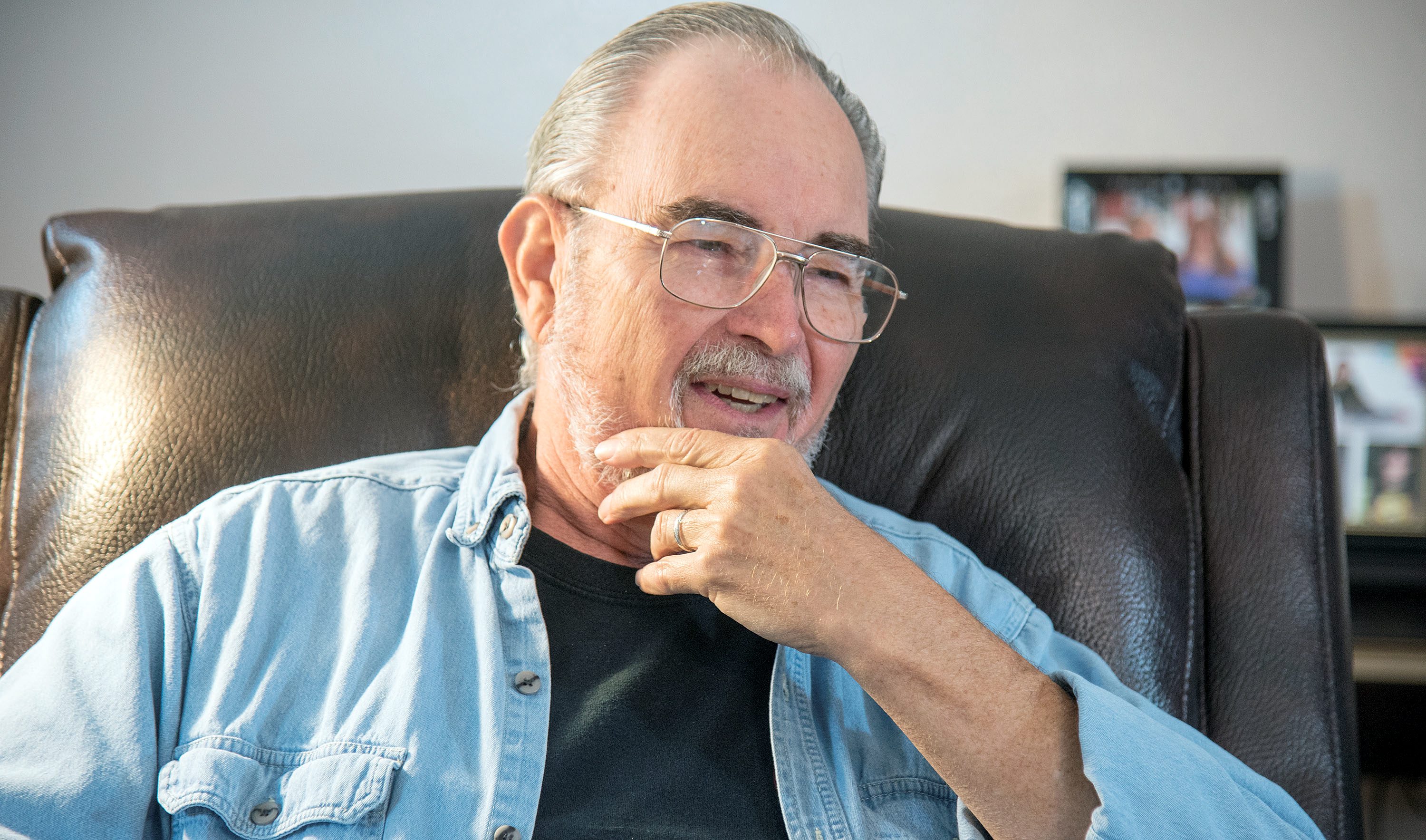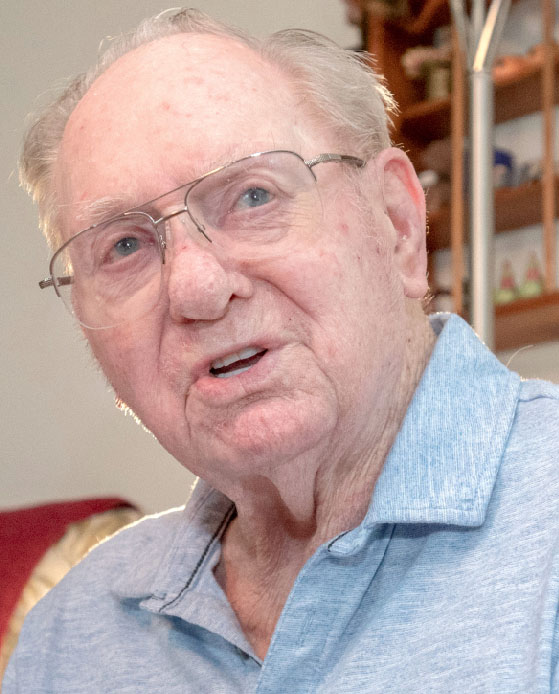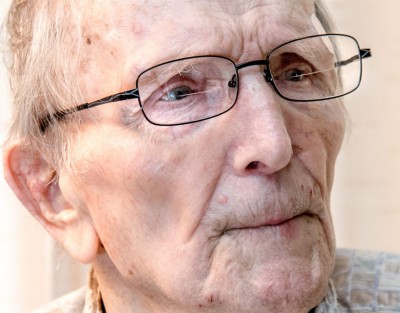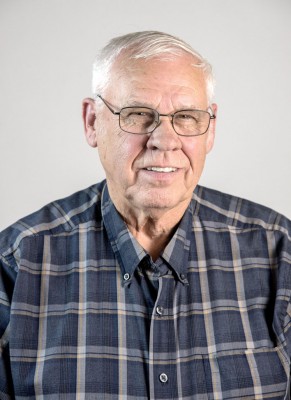Dave Walker
By Paul Wood

Photo By Stephen Haas/The News-Gazette
PHILO — Upon getting off the plane from a recent Honor Flight, Dave Walker had an unusual reaction.
The former buck sergeant said he was “embarrassed” by all the attention given the veterans on the flight.
It was a different sort of attention than what he received coming back from Vietnam in 1967 — landing in Seattle, where he got dirty looks and “was almost spit on,” he said.
Walker, 73, was drafted, and now says, “I didn’t like being there. But I’m proud of serving in Vietnam and I did a good job.”
He said that, unlike veterans of other wars, he never got a word of thanks — until more than a decade later, when his daughter wrote him a thank-you card as part of a class project.
It seems you could have a pretty mundane job and get your head blown off in Vietnam.
Walker was a storekeeper at a small compound near Qui Nhon, a coastal city in central Vietnam. A junk yard was about 5 miles away, and one of the unit’s duties was to sort out equipment that had broken down or been shot up.
Tires rarely were recycled.
“We’d dig a hole about the size of my house and set them on fire,” Walker said. “The smoke would go up a mile. It did not smell good.”
The Army employed some Vietnamese laborers — not well-paid, he said.
“They seem to need three or four men to move a piece of equipment during the workday,” he said. “At night, it only took one guy. Everything was like gold to them.”
In his contacts with South Vietnamese, Walker wasn’t very adventurous. He mostly ate rice.
“Fish heads were out of the question,” he said.
Despite a .50-caliber machine gun and a lot of light arms, it could be hard to stop hostiles from taking potshots at the small compound, backed up against a ridge.
“You’d hear the rounds whistling past you,” he remembered. “They’d just keep plinking away at you.”
Once, he jumped off a crate and landed on a fellow soldier.
He never killed an enemy soldier. “I did shoot a huge spider,” Walker said.
It could be hard to keep alert. When a ship was in — the compound was 10 miles from the coast — “we worked non-stop until the ships were loaded.”
For days.
“Once, we worked a Wednesday through Sunday stint where I got maybe three hours of sleep a night,” Walker said.
While many veterans talk about the jungle heat and monsoons, it was the sunny season that wore out Walker.
“When it was dry, you’d walk out and the sun would be so bright and so hot that the world looked like it was on over-exposed film,” he said.
There were humorous moments, even during the gunfire.
He remembers when some engineers got a forklift working and his men were filling up a flatbed truck.
“The bullets were ricocheting off the truck. The only lights out there were its headlights,” he said.
A new lieutenant yelled “shut the lights out!”
In the dark, a soldier yelled back, “Why don’t you do it?”
Among the civilian workers they encountered were ones from a Japanese corporation, Walker said.
“They had different rules of engagement,” he said.
That meant shooting and skinning dogs to eat them.
“After about three months, you didn’t see any more dogs,” he said.
After serving his 10 months in country, Walker had a long, complicated return.
From Seattle, his trip was to St. Paul, Minn., in February 1967 — a legendarily bad winter that included an ice storm here.
Some of the returnees chipped in to take a cab to Chicago. He was left off at the train station, and on the next morning, boarded the train.
“It was a milk run. We stopped in every little town on the way down,” he said.
But in Champaign, he was greeted by his mother, father and sister, and returned to a family home in Philo, where the ice storm had knocked out the power.
“We stayed in one house because the oven kept us warm,” he said.
His wartime career as a storekeeper stuck. Walker worked more than 20 years in a University of Illinois department.
Married, he has a son, a daughter and four grandchildren.
Do you know a veteran who could share a story about military service? Contact staff writer Paul Wood at pwood@news-gazette.com.
Read more stories from local veterans:
 Cleo Grovier
RANTOUL — Fireman First Class Cleo Grovier was on a landing craft headed to invade Japan when he learned two atom bombs …
Cleo Grovier
RANTOUL — Fireman First Class Cleo Grovier was on a landing craft headed to invade Japan when he learned two atom bombs …
 Carl Casella
CHAMPAIGN — Hit by a series of kamikaze planes and bombs on one day, the USS Saratoga took heavy losses, with Carl Casel …
Carl Casella
CHAMPAIGN — Hit by a series of kamikaze planes and bombs on one day, the USS Saratoga took heavy losses, with Carl Casel …
 John McNeely
ARMSTRONG — Marine John McNeely held off three attacks by the Viet Cong in a short period, and survived a grenade and a …
John McNeely
ARMSTRONG — Marine John McNeely held off three attacks by the Viet Cong in a short period, and survived a grenade and a …